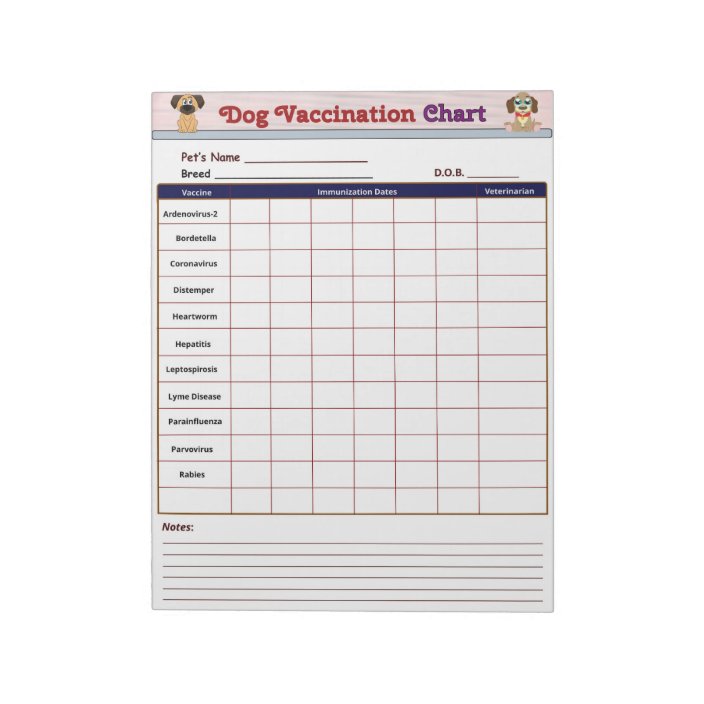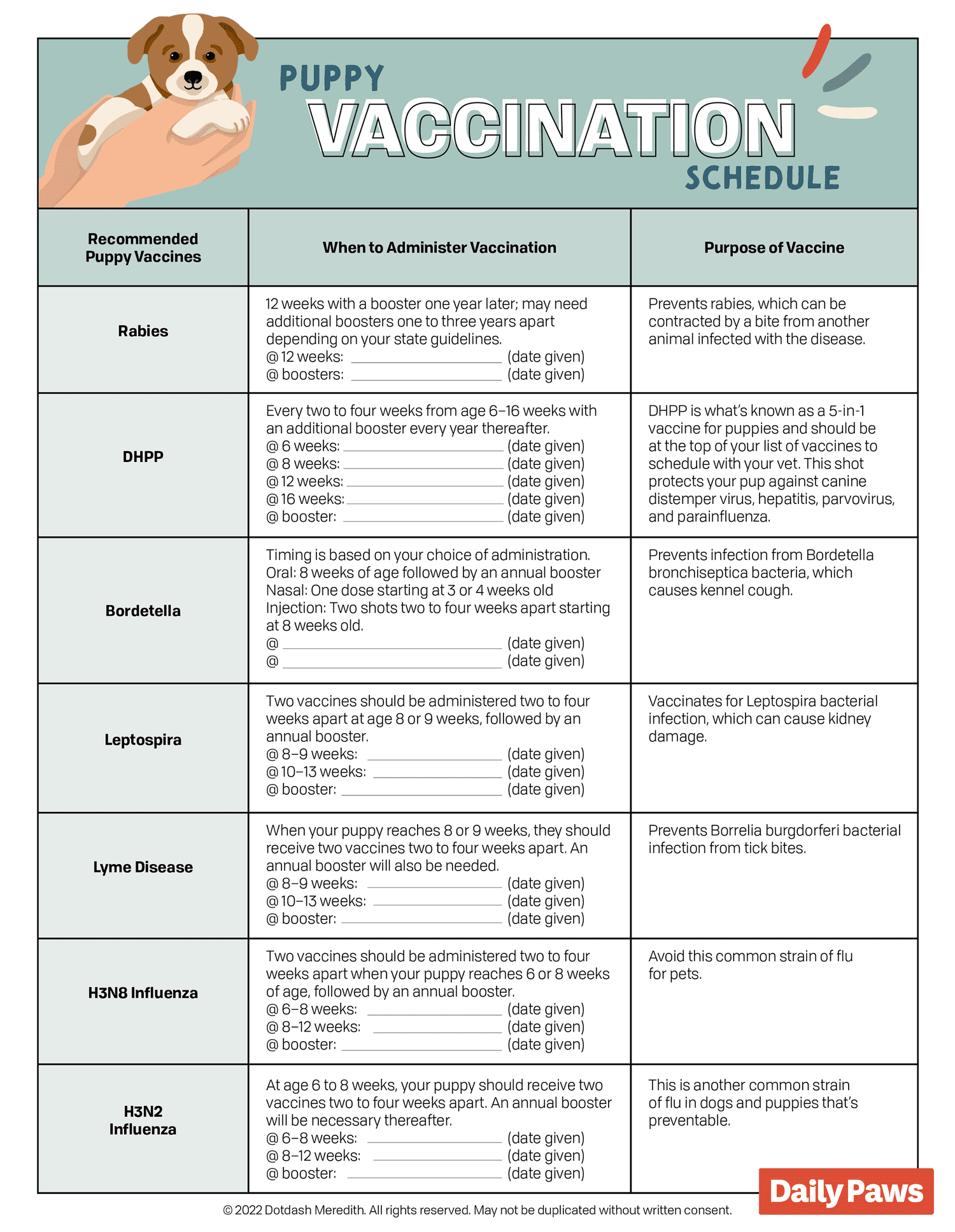Dog vaccination is an important aspect of pet care that should not be overlooked. Vaccines help protect our furry friends from a variety of potentially deadly diseases. As responsible pet owners, it is our duty to ensure that our dogs receive the necessary vaccinations at the appropriate times.
First-Year Puppy Vaccination Schedule Chart
 One useful tool that can assist us in keeping track of our puppy’s vaccination schedule is a vaccination chart. This chart provides a clear overview of the vaccines that are required during the first year of a puppy’s life. It serves as a handy reference and ensures that we don’t miss any important vaccinations.
One useful tool that can assist us in keeping track of our puppy’s vaccination schedule is a vaccination chart. This chart provides a clear overview of the vaccines that are required during the first year of a puppy’s life. It serves as a handy reference and ensures that we don’t miss any important vaccinations.
A Typical Vaccination Schedule for Your Puppy’s First Year
 There are various schedules that can be followed when it comes to puppy vaccinations. However, it is important to consult with a veterinarian to determine the best schedule for your specific puppy. To give you an idea, here is a typical vaccination schedule for your puppy’s first year:
There are various schedules that can be followed when it comes to puppy vaccinations. However, it is important to consult with a veterinarian to determine the best schedule for your specific puppy. To give you an idea, here is a typical vaccination schedule for your puppy’s first year:
- 6-8 Weeks: Distemper, Parvovirus, Hepatitis, Parainfluenza
- 10-12 Weeks: Distemper, Parvovirus, Hepatitis, Parainfluenza
- 14-16 Weeks: Distemper, Parvovirus, Hepatitis, Parainfluenza, Rabies
- 12-16 Months: Distemper, Parvovirus, Hepatitis, Parainfluenza
It is important to note that the exact timing and vaccines required may vary based on several factors, such as the puppy’s breed, location, and overall health. Consulting with a veterinarian is crucial to ensure your puppy receives the appropriate vaccines.
Importance of Vaccinations
 Vaccinations play a vital role in keeping our dogs healthy and protecting them from potentially fatal diseases. They stimulate the immune system to produce antibodies that defend against specific infections. By vaccinating our puppies, we provide them with a shield against harmful diseases that can have devastating consequences.
Vaccinations play a vital role in keeping our dogs healthy and protecting them from potentially fatal diseases. They stimulate the immune system to produce antibodies that defend against specific infections. By vaccinating our puppies, we provide them with a shield against harmful diseases that can have devastating consequences.
Some of the diseases that vaccines protect against include:
- Distemper: This viral disease affects a dog’s respiratory, gastrointestinal, and nervous systems. It can be fatal, especially in puppies.
- Parvovirus: Parvovirus causes severe vomiting and diarrhea, leading to dehydration and potentially death, particularly in young or unvaccinated dogs.
- Hepatitis: Canine hepatitis is a viral infection that primarily affects the liver. It can result in liver damage, eye issues, and even death.
- Parainfluenza: This viral respiratory infection is highly contagious and can contribute to complex respiratory diseases in dogs.
- Rabies: Rabies is a fatal virus that affects the nervous system. It can be transmitted to humans and other animals, posing a significant risk to public health.
These are just a few examples of the diseases that can be prevented through proper vaccination. Vaccines are a crucial line of defense to protect our furry companions and create a safer environment for everyone around them.
Keeping Track of Vaccinations
 With so many vaccines and appointments to keep track of, it can be overwhelming to remember when our puppies are due for their shots. That’s why vaccination charts and schedules are incredibly beneficial. They provide a visual representation of the vaccines needed at each stage, ensuring that we don’t miss any important appointments.
With so many vaccines and appointments to keep track of, it can be overwhelming to remember when our puppies are due for their shots. That’s why vaccination charts and schedules are incredibly beneficial. They provide a visual representation of the vaccines needed at each stage, ensuring that we don’t miss any important appointments.
Not only do vaccination charts help us remember the timing of each vaccine, but they also serve as a record of our puppy’s vaccination history. This information is valuable when visiting a new veterinarian or participating in activities that require proof of vaccination, such as dog parks or boarding facilities.
Conclusion
 Vaccinating our puppies is an essential part of responsible pet ownership. It protects them from deadly diseases and contributes to the overall well-being of our furry friends. By following a proper vaccination schedule and keeping track of appointments with the help of vaccination charts, we can ensure that our puppies receive the necessary vaccines at the right times.
Vaccinating our puppies is an essential part of responsible pet ownership. It protects them from deadly diseases and contributes to the overall well-being of our furry friends. By following a proper vaccination schedule and keeping track of appointments with the help of vaccination charts, we can ensure that our puppies receive the necessary vaccines at the right times.
Remember to consult with a veterinarian to determine the most appropriate vaccination schedule for your puppy. Each dog is unique, and factors such as breed, location, and health condition can influence the timing and types of vaccines needed. By prioritizing vaccinations, we can provide our puppies with a healthy start to a long and happy life.